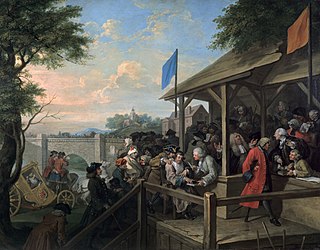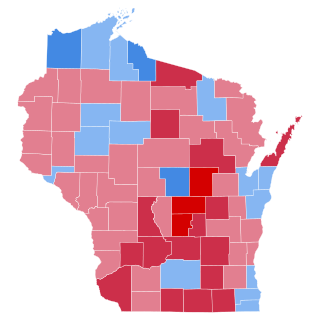Related Research Articles

Joseph Raymond McCarthy was an American politician who served as a Republican U.S. Senator from the state of Wisconsin from 1947 until his death in 1957. Beginning in 1950, McCarthy became the most visible public face of a period in the United States in which Cold War tensions fueled fears of widespread communist subversion. He alleged that numerous communists and Soviet spies and sympathizers had infiltrated the United States federal government, universities, film industry, and elsewhere. Ultimately, he was censured for refusing to cooperate with, and abusing members of, the committee established to investigate whether or not he should be censured. The term "McCarthyism", coined in 1950 in reference to McCarthy's practices, was soon applied to similar anti-communist activities. Today, the term is used more broadly to mean demagogic, reckless, and unsubstantiated accusations, as well as public attacks on the character or patriotism of political opponents.
A Tory is an individual who supports a political philosophy known as Toryism, based on a British version of traditionalist conservatism which upholds the established social order as it has evolved through the history of Great Britain. The Tory ethos has been summed up with the phrase "God, King, and Country". Tories are monarchists, were historically of a high church Anglican religious heritage, and were opposed to the liberalism of the Whig party.

The 1968 United States presidential election was the 46th quadrennial presidential election, held on Tuesday, November 5, 1968. The Republican nominee, former vice president Richard Nixon, defeated both the Democratic nominee, incumbent vice president Hubert Humphrey, and the American Independent Party nominee, former Alabama governor George Wallace. This was the last election until 1988 in which the incumbent president was not on the ballot. This was also the last election where a third-party candidate received an electoral vote.

The 1972 United States presidential election was the 47th quadrennial presidential election held on Tuesday, November 7, 1972. Incumbent Republican president Richard Nixon defeated Democratic U.S. senator George McGovern in a historic-level landslide.
A Red Scare is a form of public hysteria provoked by fear of the rise, supposed or real, of leftist ideologies in a society, especially communism. Historically, "red scares" have led to mass political persecution, scapegoating, and the ousting of those in government positions who have had connections with left-wing to far-left ideology. The name is derived from the red flag, a common symbol of communism.
Red-baiting, also known as reductio ad Stalinum and red-tagging, is an intention to discredit the validity of a political opponent and the opponent's logical argument by accusing, denouncing, attacking, or persecuting the target individual or group as anarchist, communist, Marxist, socialist, Stalinist, or fellow travelers towards these ideologies. In the phrase, red refers to the color that traditionally symbolized left-wing politics worldwide since the 19th century, while baiting refers to persecution, torment, or harassment, as in baiting.

Political colours are colours used to represent a political ideology, movement or party, either officially or unofficially. They represent the intersection of colour symbolism and political symbolism. Politicians making public appearances will often identify themselves by wearing rosettes, flowers, ties or ribbons in the colour of their political party. Parties in different countries with similar ideologies sometimes use similar colours. As an example the colour red symbolises left-wing ideologies in many countries, while the colour blue is often used for conservatism, the colour yellow is most commonly associated with liberalism and right-libertarianism, and Green politics is named after the ideology's political colour. The political associations of a given colour vary from country to country, and there are exceptions to the general trends, for example red has historically been associated with Christianity, but over time gained association with leftist politics, while the United States differs from other countries in that conservatism is associated with red and liberalism with blue. Mass media has driven a standardization of colour by political party, to simplify messaging, while historically the colour a candidate chose to identify with could have been chosen based on other factors such as family or regional variations.

In U.S. English slang, egghead is an epithet used to refer to intellectuals or people considered out-of-touch with ordinary people and lacking in realism, common sense, sexual interests, etc. on account of their intellectual interests.
The term fellow traveller identifies a person who is intellectually sympathetic to the ideology of a political organization, and who co-operates in the organization's politics, without being a formal member of that organization. In the early history of the Soviet Union, the Bolshevik revolutionary and Soviet statesman Anatoly Lunacharsky coined the term poputchik and later it was popularized by Leon Trotsky to identify the vacillating intellectual supporters of the Bolshevik government. It was the political characterisation of the Russian intelligentsiya who were philosophically sympathetic to the political, social, and economic goals of the Russian Revolution of 1917, but who did not join the Communist Party of the Soviet Union. The usage of the term poputchik disappeared from political discourse in the Soviet Union during the Stalinist era, but the Western world adopted the English term fellow traveller to identify people who sympathised with the Soviets and with Communism.

The 1950 United States Senate elections occurred in the middle of Harry S. Truman's second term as president. The 32 seats of Class 3 were contested in regular elections, and four special elections were held to fill vacancies. As with most 20th-century second-term midterms, the party not holding the presidency made significant gains. The Republican opposition made a net gain of five seats, taking advantage of the Democratic administration's declining popularity during the Cold War and the aftermath of the Recession of 1949. The Democrats held a narrow 49-to-47-seat majority after the election. This was the first time since 1932 that the Senate majority leader lost his seat, and the only instance of the majority leader losing his seat while his party retained the majority.
The Progressive Party was a left-wing political party in the United States that served as a vehicle for the campaign of Henry A. Wallace, a former vice president, to become President of the United States in 1948. The party sought racial desegregation, the establishment of a national health insurance system, an expansion of the welfare system, and the nationalization of the energy industry. The party also sought conciliation with the Soviet Union during the early stages of the Cold War.
In United States politics, modern liberalism is a form of social liberalism that is one of two current major political factions in the United States. It combines ideas of civil liberty and equality with support for social justice. Economically, modern liberalism supports government regulation on private industry and opposes corporate monopolies. It opposes cuts to the social safety net, while simultaneously promoting income-proportional tax reform policies to reduce deficits. It supports a role for government in reducing economic inequality, increasing diversity, providing access to education, ensuring healthcare, regulating economic activity, and protecting the natural environment. This form of liberalism took shape in the 20th century as the voting franchise and other civil rights were extended to a larger class of citizens, most notably among African Americans and women. Major examples of modern liberal policy programs include the New Deal, the Fair Deal, the New Frontier, the Great Society, the Affordable Care Act, and the Infrastructure Investment and Jobs Act.

The 1950 United States Senate election in California was held on November 7 of that year, following a campaign characterized by accusations and name-calling. Republican Representative and future President Richard Nixon defeated Democrat Representative Helen Gahagan Douglas, after Democratic incumbent Sheridan Downey withdrew during the primary election campaign. Douglas and Nixon each gave up their congressional seats to run against Downey; no other representatives were willing to risk the contest.

The 1968 presidential campaign of Hubert Humphrey began when Vice President of the United States Hubert Humphrey of Minnesota decided to seek the Democratic Party nomination for President of the United States following President Lyndon B. Johnson's announcement ending his own bid for the nomination. Johnson withdrew after an unexpectedly strong challenge from anti-Vietnam War presidential candidate, Senator Eugene McCarthy of Minnesota, in the early Democratic primaries. McCarthy, along with Senator Robert F. Kennedy of New York, became Humphrey's main opponents for the nomination. Their "new politics" contrasted with Humphrey's "old politics" as the increasingly unpopular Vietnam War intensified.

"Card-carrying communist" is a term popularised in the United States during the Second Red Scare as a label for members of communist and far-left organisations, especially the Communist Party of the United States. The term is still considered derogatory when used in its Cold War context.

The 1950 United States Senate election in Florida was held on November 7, 1950. Incumbent Senator Claude Pepper ran for a third term in office but was defeated in the Democratic primary by U.S. Representative George Smathers, who went on to easily win the general election.

The Mundt–Nixon Bill, named after Karl Mundt and Richard Nixon, formally the Subversive Activities Control Act, was a proposed law in 1948 that would have required all members of the Communist Party of the United States register with the Attorney General.

The 1960 United States presidential election in Wisconsin was held on November 8, 1960 as part of the 1960 United States presidential election. State voters chose 12 electors to the Electoral College, who voted for president and vice president. Politics in Wisconsin since the Populist movement had been dominated by the Republican Party. The Democratic Party became uncompetitive away from the Lake Michigan coast as the upper classes, along with the majority of workers who followed them, fled from William Jennings Bryan’s agrarian and free silver sympathies. Although the state did develop a strong Socialist Party to provide opposition to the GOP, Wisconsin developed the direct Republican primary in 1903 and this ultimately created competition between the “League” under Robert M. La Follette, and the conservative “Regular” faction. This ultimately would develop into the Wisconsin Progressive Party in the late 1930s, which was opposed to the conservative German Democrats and to the national Republican Party, and allied with Franklin D. Roosevelt at the federal level.

The 1968 United States presidential election in Wisconsin was held on November 5, 1968, as part of the 1968 United States presidential election. State voters chose 12 electors to the Electoral College, who voted for president and vice president.

Counterattack was a weekly subscription-based, anti-communist, mimeographed newsletter that ran from 1947 to 1955. It was published by American Business Consultants, a "private, independent organization" started by three ex-Federal Bureau of Investigation agents.
References
- ↑ "Mirrors of Washington", The Wall Street Journal, September 26, 1924.
- ↑ "Wallace Campaign Aims at McCarthy Elements", Washington Post , March 23, 1964.
- ↑ "The Wallace Challenge -- and Opportunity", The Wall Street Journal, March 13, 1972.